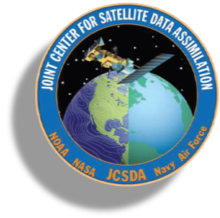In the past couple of months the JEDI effort has incorporate two fixes that amount to a world of difference in the process of transitioning GEOS from the Gridpoint Statistical Interpolation (GSI) analysis to JEDI.
Bugfix In Halo Updates Highlights Cooperation Between JCSDA Partners
JCSDA's Q4 Review Highlights Exciting Progress Across All Teams
On April 18 the JCSDA team met with our partners at NASA, NOAA, US Navy, US Air Force, and the UK Met Office to celebrate the last quarter of accomplishments and discuss goals for the upcoming quarter and AOP year. Q4 accomplishments included several important bugfixes, new sensors, and several experiments added to SkyLab v8!
JCSDA's Cheng Dang Accompanies UCP Directors on Visit to Utah Universities
Earlier this month JCSDA’s Cheng Dang joined Bill Kuo, UCP Director, and Mohan Ramamurthy, Director of EODS Center and Unidata, on a four day visit to Utah State University and the University of Utah. Along with presentations and seminars about JCSDA for the students, they met with faculty using JEDI and data assimilation in their own research.
Joint NASA/JCSDA Code Sprint Greatly Increases R2D2 Sustainability
JCSDA Announces Eighth Public Release of Skylab
JCSDA’s 2023 Q3 Review Shows Exciting Progress
On Thursday, January 25, the JCSDA core team and partners from NOAA, NASA, U.S. Navy and Air Force, and the UK Met Office met virtually and in-person to review accomplishments from the last three months and discuss future goals. This quarter saw a lot of functionality added to SkyLab with the release of SkyLab v7, two spack-stack releases, numerous additional sensors, and much more!
JCSDA Announces Seventh Public Release of Skylab
The JCSDA is pleased to announce the release of Skylab 7.0!
JCSDA SkyLab 7.0 is the seventh roll-up release that provides integrated Earth System Data Assimilation capability. All JEDI code is open source and publicly available at https://github.com/JCSDA. Capabilities are demonstrated via the SkyLab testbed experiments conducted internally at JCSDA for the following components
Save the Date for the 2024 JCSDA Technical Review Meeting and Science Workshop
Brief Report on the Status of GEOS-JEDI
The first phase of transitioning the NASA GMAO GEOS atmospheric data assimilation capabilities to JEDI involves the replacement of the Grid-point Statistical Interpolation (GSI) with a corresponding JEDI analysis. This includes taking JEDI's Unified Observation Operator (UFO), its underlying dependencies, and the JEDI solver that enables a hybrid 4DEnVar strategy similar to what is used in the current GEOS-GSI system.











